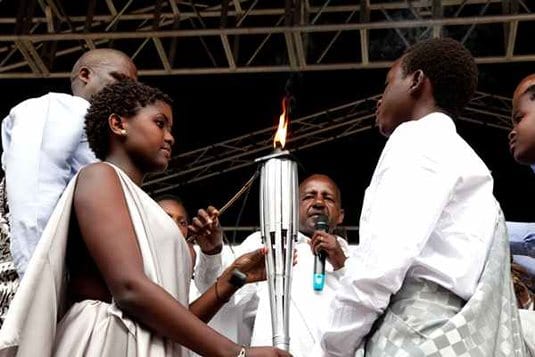
Rwandan youth carry the Kwibuka flame to commemorate 20 years since the Genocide took place in Rwanda: The French youth are pressing their government to accept their role in the Genocide that claimed over a million people
Who Is Lionel?
In life we have two choices: to live with our circumstances or to fight against the odds.
I (pictured below) was born in Rwanda on December 3, 1992, in Nyundo, a community in the Rubavu District of the western province of Rwanda on the Sebeya River to the east of Gisenyi.
Nyundo is the location of one of the first Catholic missions to be established in Rwanda, and today, it is the headquarters of the Roman Catholic Diocese of Nyundo.
Born to Hutu parents who were both veterinary doctors, it was only a year and some
months later that we were forced to flee Rwanda after the 1994 massacres.
I grew up in the most-complex circumstances: My childhood is marred by sad memories and denial of my identity for most of my youth.
RELATED: PAUL KAGAME IS NOT GOD, THERE ARE PLENTY OF LEADERS TO SUCCEED HIM
Keep Up With Face2Face Africa On Facebook!
As a child, I was harassed for belonging to the Hutu clan — everyone hated Rwandans for  different reasons. The Congolese hated us because we had brought war to their country while others saw us as “Genocidaires.”
different reasons. The Congolese hated us because we had brought war to their country while others saw us as “Genocidaires.”
This animosity toward my people led me to hating who I was. I chose not to learn Kinyarwanda (my mother tongue) and tried to conform to the foreign land as best as I could.
Why Politics?
After successfully completing my secondary education at Cambridge, I did not know what to do. I was barely 15 years old and still naïve about many aspects of life.
I started doing A Levels in Arts and was inspired by Sydney Chisenga (Esq.), a young advocate who made Partner at Corpus Global, one of the leading law firms in Zambia, in his early 30s.
Chisenga took pride in reading the law and mentored me by subjecting me to
the most stringent of rules there is; I had no choice but to read extensively and consistently.
As I was reading the law, I came across the notion that everyone ought to be equal in the eyes of the law. This impacted me because many of the refugees I knew were being mistreated by the immigration officers who abused their rights due to their status.
I kept asking myself whether this notion was a fallacy.
After thorough research, I discovered that the reason why certain people are more equal than others is because they know their rights too well to be taken advantage of.
Law School
My A Level days were now over, and I enrolled in law school, where I met critical minds such as Reagan Blankfein Gates (Esq.), Barnabas Bwalya (Esq.), and Dr. Etienne Mutabazi just to mention a few.
They all allowed me to express my views without fear or favour.
I nurtured a keen interest in Rwandan history, and a number of friends helped me understand it, including Theogene Karenzi, David Himbara, Darius Murinzi, Donat Gapyisi, and Nelson Mandela just to mention a few.
I ended up writing my dissertation on “The Legal Challenges Faced By the International Criminal Tribunal for Rwanda Acquitted Persons in Relocation.”
Many people who knew little about Rwanda came to understand what really transpired during the 1994 massacres through my writings.

I have exposed the tyranny of the Paul Kagame regime through my published articles, which have helped many Zambians in seeing Kagame for who he really is: a dictator who will stop at nothing to cling to power — even if it means killing the entire Rwandan race.
My Advice to Young Rwandans
Nothing is as powerful as a dream kept alive. I am a 22-year-old former Rwandan refugee in possession of a Bachelor’s Degree of Laws (LLB). I speak three international languages fluently, namely English, French, and Swahili.
 I did not allow my status to define me. I worked so hard to be someone and am able to make positive contributions to many issues concerning my people.
I did not allow my status to define me. I worked so hard to be someone and am able to make positive contributions to many issues concerning my people.
Let us study what we are passionate about and endeavor to participate in Rwandan politics. The future of Rwanda is in our hands. We must learn from the elders and use our exposure to build a better Rwanda.
Only a free-minded youth will be able to liberate Rwanda.
VERBA VOLENT, SCRIPTA MANENT.
(“Spoken Words Fly Away, Written Words Remain.”)
SEE ALSO: President Obama on Continent: Africa’s Progress Is Good for America










